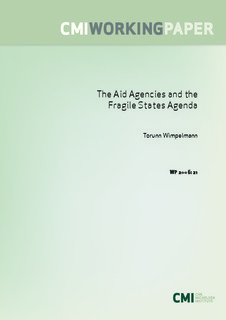| dc.description.abstract | In recent years, a consensus appears to have emerged that a variety of problems can be understood in terms of state failure. This paper reviews one aspect of this trend, the concept of fragile states that has recently been adopted by development agencies. The term is used by donors to refer to states that are failing to adopt policies and institutions believed necessary for development. According to donors, not only does such failure affect development outcomes, fragile states are also associated with violent conflicts and related security threats. The paper argues the fragile state concept must be critically reconsidered on both accounts. First, whether the concept can be said to capture the dynamics and policies associated with so-called developmental states is doubtful. Second, equating a states ability to promote development with its capacity to prevent and reduce violent conflict, while a drawing upon a common conflation within the so-called securitydevelopment nexus, is not supported by historical evidence. | |
